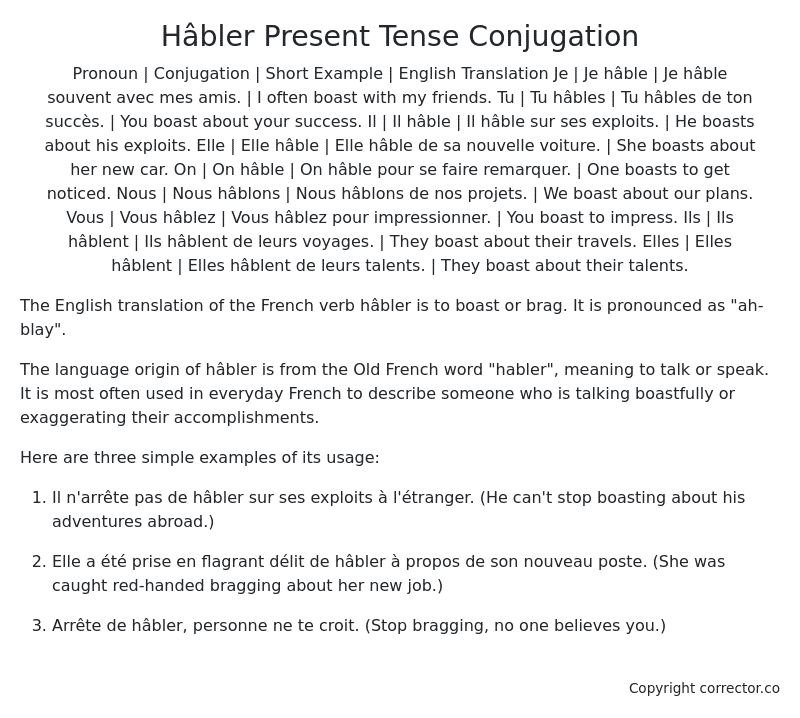Le Present (Present Tense) Conjugation of the French Verb hâbler
Introduction to the verb hâbler
The English translation of the French verb hâbler is to boast or brag. It is pronounced as “ah-blay”.
The language origin of hâbler is from the Old French word “habler”, meaning to talk or speak. It is most often used in everyday French to describe someone who is talking boastfully or exaggerating their accomplishments.
Here are three simple examples of its usage:
-
Il n’arrête pas de hâbler sur ses exploits à l’étranger. (He can’t stop boasting about his adventures abroad.)
-
Elle a été prise en flagrant délit de hâbler à propos de son nouveau poste. (She was caught red-handed bragging about her new job.)
-
Arrête de hâbler, personne ne te croit. (Stop bragging, no one believes you.)
Hâbler – About the French Present Tense
To take a deep dive into all the French tenses then see our article on Mastering French Tense Conjugation.
Common Everyday Usage Patterns For Le Present
Interactions with Other Tenses
Table of the Present Tense Conjugation of hâbler
Pronoun | Conjugation | Short Example | English Translation
Je | Je hâble | Je hâble souvent avec mes amis. | I often boast with my friends.
Tu | Tu hâbles | Tu hâbles de ton succès. | You boast about your success.
Il | Il hâble | Il hâble sur ses exploits. | He boasts about his exploits.
Elle | Elle hâble | Elle hâble de sa nouvelle voiture. | She boasts about her new car.
On | On hâble | On hâble pour se faire remarquer. | One boasts to get noticed.
Nous | Nous hâblons | Nous hâblons de nos projets. | We boast about our plans.
Vous | Vous hâblez | Vous hâblez pour impressionner. | You boast to impress.
Ils | Ils hâblent | Ils hâblent de leurs voyages. | They boast about their travels.
Elles | Elles hâblent | Elles hâblent de leurs talents. | They boast about their talents.
Other Conjugations for Hâbler.
Le Present (Present Tense) Conjugation of the French Verb hâbler (this article)
Imparfait (Imperfect) Tense Conjugation of the French Verb hâbler
Passé Simple (Simple Past) Tense Conjugation of the French Verb hâbler
Passé Composé (Present Perfect) Tense Conjugation of the French Verb hâbler
Futur Simple (Simple Future) Tense Conjugation of the French Verb hâbler
Futur Proche (Near Future) Tense Conjugation of the French Verb hâbler
Plus-que-parfait (Pluperfect) Tense Conjugation of the French Verb hâbler
Passé Antérieur (Past Anterior) Tense Conjugation of the French Verb hâbler
Futur Antérieur (Future Anterior) Tense Conjugation of the French Verb hâbler
Subjonctif Présent (Subjunctive Present) Tense Conjugation of the French Verb hâbler
Subjonctif Passé (Subjunctive Past) Tense Conjugation of the French Verb hâbler
Subjonctif Imparfait (Subjunctive Imperfect) Tense Conjugation of the French Verb hâbler
Subjonctif Plus-que-parfait (Subjunctive Pluperfect) Tense Conjugation of the French Verb hâbler
Conditionnel Présent (Conditional Present) Tense Conjugation of the French Verb hâbler
Conditionnel Passé (Conditional Past) Tense Conjugation of the French Verb hâbler
L’impératif Présent (Imperative Present) Tense Conjugation of the French Verb hâbler
L’infinitif Présent (Infinitive Present) Tense Conjugation of the French Verb hâbler
Struggling with French verbs or the language in general? Why not use our free French Grammar Checker – no registration required!
Get a FREE Download Study Sheet of this Conjugation 🔥
Simply right click the image below, click “save image” and get your free reference for the hâbler Present Tense tense conjugation!

I hope you enjoyed this article on the verb hâbler. Still in a learning mood? Check out another TOTALLY random French verb present conjugation!


